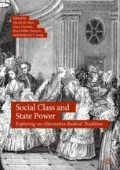Abstract
Big business, Childs stresses, has not been the adversary of the state. Rather, big business has encouraged the growth of state power and has used state power to increase its wealth and social influence. It is the political role of big business and not the inherent dynamics of the market which should be seen as accounting for wealth concentration—and also both the growth in state regulation of the economy and an ongoing pattern of foreign military intervention.
Access this chapter
Tax calculation will be finalised at checkout
Purchases are for personal use only
Notes
- 1.
Gabriel Kolko, The Triumph of Conservatism (Chicago: Quadrangle 1967) 4–5.
- 2.
James Weinstein, The Corporate Ideal in the Liberal State (Boston: Beacon 1968) ix.
- 3.
Gabriel Kolko, Railroads and Regulation (Princeton: Princeton UP 1965) 3–5.
- 4.
See both Kolko books for factual proof of this. Weinstein does not take this fact into account in his book, and thus underestimates this as a motivating force in the actions and beliefs of businessmen. For a theoretical explanation, see Murray N. Rothbard, Man, Economy and State (Los Angeles: Nash 1971) 566–85.
- 5.
Kolko, Railroads 26.
- 6.
Kolko, Railroads 17 [Editors’ note—Kolko (slightly mis)quotes Chauncey M.Depew, “Leaves from My Autobiography: Fifty-Six Years with the New York Central Railroad,”Scribner’s Magazine71.2 (Feb. 1922): 152 (we have corrected the quote in light of the original)].
- 7.
The twin facts here that Vanderbilt needed “converting” and that he had other options open to him should by themselves put to rest the more simplistic Marxist theories of “class consciousness,” awareness of interests and relationships to the means of production.
- 8.
Kolko, Railroads 65–6.
- 9.
Kolko, Railroads 74.
- 10.
It is instructive to note that most of these patents were illegitimate according to libertarian ownership theories, since many other men had independently discovered the telephone and subsequent items besides Bell and the AT&T group, yet they were coercively restrained from enjoying the product of such creativity. On the illegitimacy of such patent restriction, see Rothbard, Man, Economy and State 652–60.
- 11.
Kolko, Triumph 30–39.
- 12.
Weinstein 82.
- 13.
Kolko, Triumph 103.
- 14.
Kolko, Triumph 103.
- 15.
Kolko, Triumph 129.
- 16.
Weinstein Ideal 180.
- 17.
Kolko, Triumph 180.
- 18.
Kolko, Triumph 173–74.
- 19.
Kolko, Triumph 183.
- 20.
Weinstein Ideal 91.
- 21.
Walter LeFeber, The New Empire: An Interpretation of American Expansion, 1860–1890 (Ithaca, NY: Cornell UP 1963) 239, 273n. The note on Carnegie’s linking of the Venezuela boundary dispute with obtaining large orders of steel from the Navy was taken from Carnegie’s correspondence.
- 22.
Weinstein 91.
- 23.
Weinstein 133–135.
Author information
Authors and Affiliations
Editor information
Editors and Affiliations
Rights and permissions
Copyright information
© 2018 The Author(s)
About this chapter
Cite this chapter
Hart, D.M., Chartier, G., Kenyon, R.M., Long, R.T. (2018). Roy A. Childs, “Big Business and the Rise of American Statism” (1969, 1971). In: Hart, D., Chartier, G., Kenyon, R., Long, R. (eds) Social Class and State Power. Palgrave Macmillan, Cham. https://doi.org/10.1007/978-3-319-64894-1_32
Download citation
DOI: https://doi.org/10.1007/978-3-319-64894-1_32
Published:
Publisher Name: Palgrave Macmillan, Cham
Print ISBN: 978-3-319-64893-4
Online ISBN: 978-3-319-64894-1
eBook Packages: Social SciencesSocial Sciences (R0)

